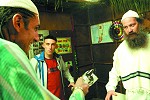 Arthouse films ’05/’06
Arthouse films ’05/’06USHPIZIN | WAL-MART: HIGH COST OF LOW PRICE
< < M O R E | M O R E > >
last update 27.Jan.06
See also: SHADOWS FILM FESTIVAL | SHORT FILMS
 R E V I E W B Y R I C H C L I N E
R E V I E W B Y R I C H C L I N E
 This shockingly simple documentary examines one suicide bomb from every angle, trying to see the broad impact of a terrorist attack. This bigger picture is startlingly moving, and bravely balanced.
This shockingly simple documentary examines one suicide bomb from every angle, trying to see the broad impact of a terrorist attack. This bigger picture is startlingly moving, and bravely balanced.
The tragedy took place on 18 June 2002 in Jerusalem, when 20 people on a city bus were killed in a horrific explosion. Filmmakers then spent more than a year getting the details and conducting interviews, followed by more than a year of post-production. The material is comprehensive, assembled with a striking refusal to take sides, even though there's a clear villain.
The families of four victims--a bright teen dancer, a student teacher, a newlywed wife and an Ethiopian Christian girl--talk about that fateful day, how they said goodbye, how they got the news, how their lives have been changed as a result. In addition, we hear from rescue workers who arrived at the scene, doctors, policemen, reporters, army officers responsible for the retaliation and even a couple of young men who lived through the ordeal.
And the most striking footage is of the bomber himself, a law student. We see home movies, interviews with his family and even his driver from that day. These people are grieving as well, even as they understand the sense of oppression that drove this young man to such terrible action. Adding this angle to the film makes it immediately both political and objective. We are forced to look far beyond our original outrage at a headline on a newscast, to understand the driving force behind the violence as well as the emotional response from all sides of the issue.
Perhaps the film is a bit too straightforward for its own good. It merely presents the footage and lets us sort it out. Most interviews are off camera in voiceover, while we watch home video footage of life before that day, and then unnerving scenes of the aftermath. With verbal descriptions this detailed, we don't need to see the gruesome reality, but when we get one explicit glimpse at the end it's still unspeakable. And also profound. Especially when combined with such a deeply personal examination of such a terrible political situation.
The Diameter of the Bomb
by Yehuda Amichai
The diameter of the bomb was thirty centimeters
and the diameter of its effective range about seven meters,
with four dead and eleven wounded.
And around these, in a larger circle
of pain and time, two hospitals are scattered
and one graveyard. But the young woman
who was buried in the city she came from,
at a distance of more than a hundred kilometers,
enlarges the circle considerably,
and the solitary man mourning her death
at the distant shores of a country far across the sea
includes the entire world in the circle.
And I won’t even mention the crying of orphans
that reaches up to the throne of God and
beyond, making
a circle with no end and no God.
with families/friends of Shani Avi-Zedek, Michal Biazi, Aiman Kabha, Galila Bugala, Mohammad al-Ral; Yoni, Michael, Achmed, Orla Guerin, Ariel Sharon
 release UK 31.Mar.06
release UK 31.Mar.0605/UK-Canada 1h26
TORONTO FILM FEST
17.Jan.06
 R E V I E W B Y R I C H C L I N E
R E V I E W B Y R I C H C L I N E
 MUST-SEE
MUST-SEE
 One of the most unnerving and harrowing thrillers in recent memory, this low-budget French film is an extremely promising debut for Georgian filmmaker Gela Babluani.
One of the most unnerving and harrowing thrillers in recent memory, this low-budget French film is an extremely promising debut for Georgian filmmaker Gela Babluani.
Sebastien (George Babluani) is a 20-year-old workman who loses his job, and his paycheque, when his boss (Passon) is found dead in the bath. But Sebastien overheard his money-making scheme, so he intercepts a letter and follows the instructions, which take him to a secret countryside home outside Paris, where he discovers far too late that he's now part of an illicit game that wagers on human life. And his odds of surviving get worse with each round of play.
Filmed in the style of a classic Soviet-era drama, the writer-director uses stark black and white photography and minimal music and dialog to tell his story in the faces of the characters. The tension builds slowly, dropping hints and suspicions in the increasingly shady people Sebastien encounters on his odyssey. There's a constant sense of gritty realism; it never drifts into overwrought action, and the result is both gripping and horrifying.
Side characters add all kinds of texture, especially Sebastien's competitors--from the hard-nosed Recoing, working for his mercurial brother (Vandevelde), to the terrified Viliers. And Bongard's frazzled emcee is thoroughly unsettling. The men that swirl around them seem cold-hearted or sadistic by comparison, which is seriously disconcerting to both the players and to us. The more we see of this shadowy world, the harder it is to watch.
At the centre is a superb performance from George Babluani (the director's brother on and off screen). We can see his innocence draining out of him as he falls deeper into this terrifying situation, developing steely callousness around what's left of his humanity. As the story progresses, we are forced along with him to examine issues of mortality from gut-wrenching new angles. In some ways it's difficult to imagine a film more intensely frightening than this, simply because it travels so deeply under the skin to rattle our nerves right through the hellish climax and into two final scenes that tie it up in unexpected, gruelling, ironic ways.
scr Sabine Bauchart
with George Babluani, Aurélien Recoing, Pascal Bongard, Vania Vilers, Fred Ulysse, Christophe Vandevelde, Augustin Legrand, Philippe Passon, Joe Prestia, François Rimbau, Gela Babluani
 release UK 6.Jan.06,
release UK 6.Jan.06,Fr 1.Feb.06, US 28.Jul.06
05/France MK2 1h26
Best First Feature:
VENICE FILM FEST
28.Dec.05
 R E V I E W B Y R I C H C L I N E
R E V I E W B Y R I C H C L I N E
 Like an Isaac Bashevis Singer fable, this warm-hearted story hinges on significant spiritual meaning, which makes it a real find for audiences who long for movies that deal meaningfully with issues of faith. It's a bit precious, perhaps, but still charming.
Like an Isaac Bashevis Singer fable, this warm-hearted story hinges on significant spiritual meaning, which makes it a real find for audiences who long for movies that deal meaningfully with issues of faith. It's a bit precious, perhaps, but still charming.
Moshe (Shuli Rand) is a devoutly religious member of an Orthodox synagogue in Jerusalem, but as a full-time religious student, he's penniless. Which his wife Mali (Michal Bat-Sheva Rand) isn't too happy about, with the Succoth holiday coming. So both pray for God's help, and sure enough, an envelope of money and a borrowed succah (temporary dwelling) arrive just in time. Then come the ushpizin (guests), unexpected visitors (Mizrahi and Ganani) from Moshe's violent past. Suddenly it doesn't look quite so miraculous after all.
There are other issues, including Moshe and Mali's childlessness (they feel like Abraham and Sarah, waiting for a son) and the way their tight religious community reacts to having two such obvious outsiders in their midst. But the steady hand of faith keeps things moving forward, as the filmmakers examine religious themes as well as more universal ideas such as what happens when people make a drastic change in their lives--namely, that it doesn't get easier, as they expect it should.
Performances are earthy and natural, full of energy and humour (Mali is especially feisty), and the gut-level religious expression is deeply felt. This is a lovely examination of the tensions between old and new lives, between being deeply human and longing for some divine intervention. When everything begins to turn sour, it gets rather ugly, but in such a way that we can easily sympathise. The highs and lows for Moshe and Mali resonate strongly.
The film will have a limited appeal at the box office, and not only because it's a foreign film with subtitles. The spirituality is so deeply woven into the identities of the characters and situations that viewers without much grounding in some sort of faith may find it difficult to connect with. Yet while it's a specifically Jewish story, it has a lot to say to anyone with any sort of faith.
scr Shuli Rand
with Shuli Rand, Michal Bat-Sheva Rand, Shaul Mizrahi, Ilan Ganani, Avraham Abutboul, Yonathan Danino, Daniel Dayan, Daniel Rand, Michael Vaigel, Yizhak Levkovits, Shmuel Ovadia
 release Isr Aug.04,
release Isr Aug.04,US 19.Oct.05,
UK 17.Mar.06
04/Israel 1h33
ISRAELI FILM ACADEMY
11.Jan.06
 R E V I E W B Y R I C H C L I N E
R E V I E W B Y R I C H C L I N E
 There's a strong message in this documentary, but filmmaker Greenwald seems so angry at Wal-Mart that he misses the much more powerful, bigger picture. Still, in his attempt to paint a specific picture of one corporation, you've got to admit that he's thorough.
There's a strong message in this documentary, but filmmaker Greenwald seems so angry at Wal-Mart that he misses the much more powerful, bigger picture. Still, in his attempt to paint a specific picture of one corporation, you've got to admit that he's thorough.
The film takes a jab at just about every aspect of Wal-Mart's community interaction, from low wages and discriminatory policies to environmental violations and third-world sweatshops. The filmmakers never make any attempt at objectivity--this isn't a fair documentary by any means. It's an all-out attack, complete with manipulative movie techniques (cue another piece of mood music) and one-sided arguments. Basically they take footage of Wal-Mart President Lee Scott's rah-rah speeches, about how wonderful the company is, and then counter everything he says with evidence that the true picture is completely the opposite.
Some of the footage is quite shocking, especially when the film focuses on the company's terrible employee record, paying below-poverty wages with limited health coverage and shockingly terrible treatment of women and minorities. But the filmmakers over-play their hand, piling on wrenchingly emotional footage, much of which is actually irrelevant to their argument (it's not Wal-Mart's fault that an employee has crying children or that a small-town motel goes out of business).
More damning is the way the company takes advantage of corporate law and lenient governments all over the world. Subsidies given in America actually undermine local-owned businesses, while working conditions are appalling in factories in China, Bangladesh and Honduras. These things aren't Wal-Mart's fault, but they are definitely taking advantage of them. And the Walton family won't like the way they come off as Scrooge-like misers.
Frankly, this is the nature of the corporate beast. In a society in which consumerism demands ever-lower prices and capitalism demands ever-higher profits, what can we expect besides this kind of thing? The fact is that yes, Wal-Mart is an irresponsible and often downright nasty corporation. And so are most mega-companies. But Greenwald never mentions anyone else, or the larger issues involved, and as a result the film merely feels like a ranting personal attack.
with Lee Scott, Edith Arana, Diane DeVoy, Red Esry, Stan Fortune, Jon Hunter, Donna Lisenby, Jim Bill Lynn, Altagracia Perez, Neil Stockwell, Laura Tanaka, Jon Stewart
 release US 4.Nov.05,
release US 4.Nov.05,UK 12.May.06
05/US Brave New Films 1h35
27.Jan.06


See also: SHADOWS FILM FESTIVAL | SHORT FILMS
© 2006 by Rich Cline, Shadows
on the Wall